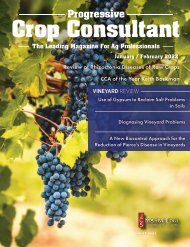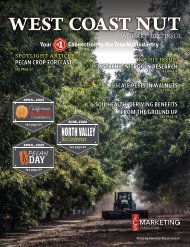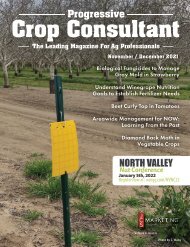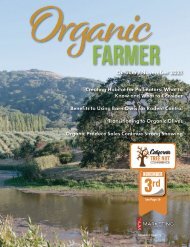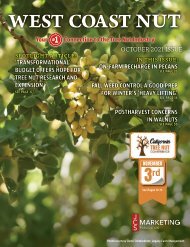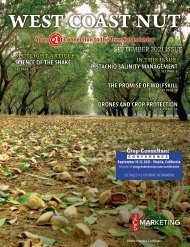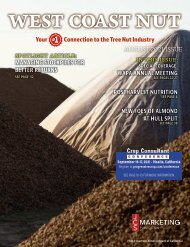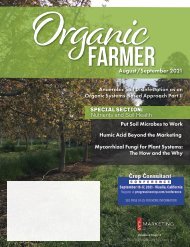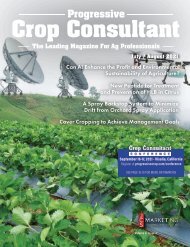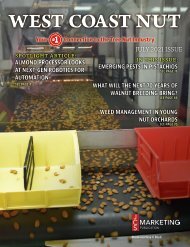PCC MarchApril Final Draft
Create successful ePaper yourself
Turn your PDF publications into a flip-book with our unique Google optimized e-Paper software.
NAVEL ORANGEWORM MANAGEMENT<br />
discolored. Precise and accurate diagnosis<br />
of Pythium diseases will therefore<br />
require lab-based tests and assays.<br />
Managing Pythium<br />
Controlling diseases caused by Pythium<br />
requires the implementation of IPM<br />
practices.<br />
Site selection: Choose to plant in fields<br />
that do not have a history of Pythium<br />
problems and have well-draining soils.<br />
Crop rotation: If Pythium is an issue,<br />
avoid planting the same susceptible<br />
crop in the infested field. Rotate to<br />
crops that are not known to be susceptible<br />
to the Pythium species present at<br />
that location. However, remember that<br />
some Pythium species have very broad<br />
host ranges (Table 2).<br />
Irrigation management: Because the<br />
Pythium pathogen is so strongly dependent<br />
on wet soil conditions, carefully<br />
schedule and limit irrigations to prevent<br />
overwatered, saturated soils.<br />
Time of planting: In some cases, moving<br />
the planting date to a different time<br />
of year may help reduce losses to Pythium.<br />
For example, depending on the<br />
Pythium species of concern, planting<br />
the crop in the warmer, drier summer<br />
may be preferred to seeding the crop in<br />
the cooler, wetter spring.<br />
Fungicides: Plant seed treated with a<br />
fungicide that is active against Pythium.<br />
Note that the fungicides used to control<br />
Rhizoctonia or Fusarium have no effect<br />
on Pythium. For some crops, applying<br />
fungicides to the emergent crop may<br />
provide additional protection. The repeated<br />
use of products having the same<br />
mode of action can result in Pythium<br />
isolates that are insensitive (=resistant)<br />
to those products; therefore, IPM strategies<br />
will require that thought be given<br />
to deploying different fungicides.<br />
Resistant or tolerant cultivars: Unfortunately,<br />
there do not appear to be any<br />
row crop cultivars that have genetic<br />
resistance to Pythium.<br />
Comments about this article? We want<br />
to hear from you. Feel free to email us at<br />
article@jcsmarketinginc.com<br />
INCORPORAT ED<br />
INSECT PHEROMONE & KAIROMONE SYSTEMS<br />
Your Edge – And Ours – Is Knowledge.<br />
trece.com<br />
CIDETRAK ® NOW MESO <br />
• Turned on 24-7<br />
• No maintenance/No second guessing<br />
• Full season results<br />
• More Pheromone distribution<br />
®<br />
— Joe Coelho,<br />
Maricopa Orchards<br />
Joe’s IPM Program<br />
LEARN MORE<br />
© 2021, Trécé Inc., Adair, OK USA • TRECE, PHEROCON and CIDETRAK are registered trademarks of Trece, Inc., Adair, OK USA • TRE-1882, 1/21<br />
March / April 2021 www.progressivecrop.com 17




